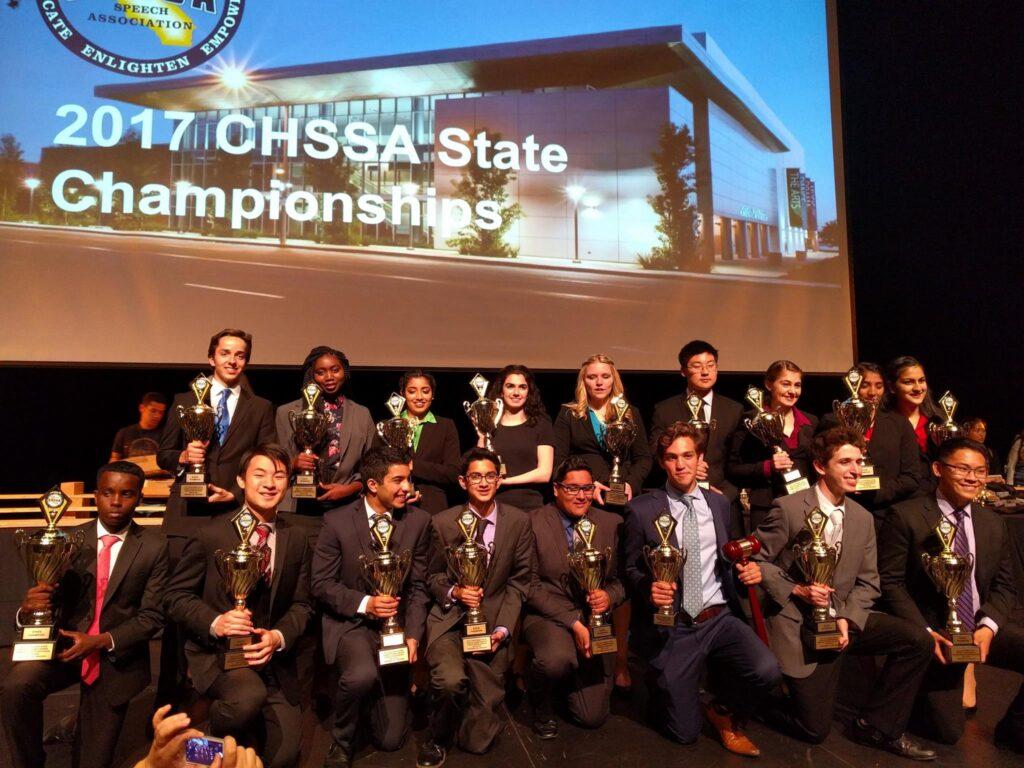Two hours before the awards ceremony at the 2017 California State Speech and Debate tournament in Arcadia last June, then-juniors Varun Viswanath, Divya Rallabandi, Kyle Wang and then-sophomore Arian Raje gathered at a nearby mall to await the results at a Panda Express.
“It was just like hanging out at Valley Fair,” Viswanath said, “except we were wearing suits.”
When their coach, Chris Harris, let them know the results at the award ceremony, they were ecstatic.
“It was a pretty gratifying moment because I hadn’t made it the year before,” Raje said. “It kind of served to validate all the work I had put in throughout the year.”
During the 2016-17 competitive season, the team enjoyed historic success at contests like the State Tournament. Wang won first place at states in Extemporaneous Speaking, beating more than 200 competitors, the first SHS student to do so well in years.
“To be perfectly honest, I was stunned when they announced the final placing at states,” Wang said. “I tried to contain it, but I think on the video my dad took there’s a little moment where I just look like I’ve been hit with a brick.”
During the tournament, Wang had only 30 minutes to prepare a 7-minute speech for questions such as “How should the U.S. change its strategy in the fight against ISIS?”
In addition, Viswanath and Rallabandi took second and third place respectively in Oratorical Interpretation, and Raje placed fourth in Extemporaneous Speaking. Their debate topic was “The United States ought to replace the Electoral College with a direct national vote.”
In debate, seniors Aayush Aggarwal and his partner Arun Ramakrishna as well as senior Austin Wang and his partner Siavash Yaghoobi qualified to the prestigious Tournament of Champions hosted at the University of Kentucky.
Wang and Raje reached the quarterfinals in Extemporaneous Speaking at the Tournament of Champions hosted at Northwestern University.
Finally, Wang was yet again successful at the 2017 National Tournament in June, placing fifth out of 256 competitors from around the U.S.
In the three tournament days, he gave 13 speeches.
“I was dead tired by the time finals rolled around,” Wang said. “Making it to semifinals was honestly about as far as I’d expected to go, so I was really happy to have made it that far.”
For the 2017-18 season, Raje said, the captains have shifted their focus on building a legacy of competitive success.
“Coach Harris has made sure that the captains are really accountable this year,” Raje said, “so everyone is making sure to do their best to train the new freshmen,” Raje said.
Program enrollment nearly doubled this year, with fifty members registered in total. Many enrollees are freshmen with previous experience, including competition at the middle school state and national level.
The captains have capitalized on this additional interest and skill by providing more structured practices. In past years, Raje and the other captains often designed practice based on “whatever they felt like doing that day.” Now, most captains have planned out practices up to one week in advance.
“I think there is a lot of talent amongst the freshmen, especially from people who have done it in middle school and already have a lot of experience,” Raje said.
Most returning speech and debate members — including incoming freshman — have already set their sights on placing at tournaments in their respective events. Nonetheless, Rallabandi and Viswanath also hope to encourage the freshmen to try new events as they, too, branch out in their final year of competition.
For instance, Viswanath has competed in Oratorical Interpretation since freshman year, but has also written an Original Oratory piece which he plans to use at tournaments this season.
Rallabandi, who has competed in Oratorical Interpretation for the past three years, plans to branch out to Original Oratory and Thematic Interpretation — events which she has tried in the past but never pursued fully.
“I’m really looking forward to improving upon myself and helping guide other younger students this year,” Rallabandi said.


























